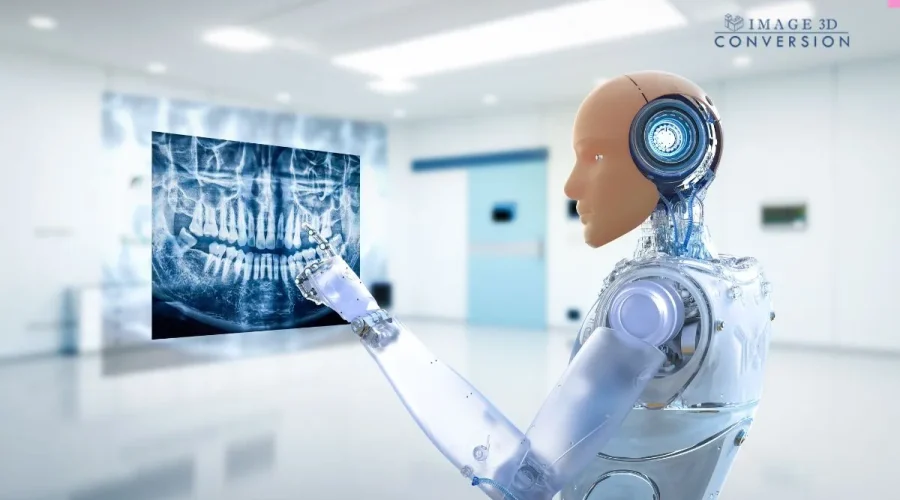The world of dentistry is ever-evolving. To have more precise treatment planning and enhance better patient experiences, Science and technology are working relentlessly. The recent addition of artificial intelligence is the new cherry on top!
The Role of AI in Digital Dentistry
Artificial Intelligence (AI) is rapidly transforming healthcare, with digital dentistry emerging as a key beneficiary of this technological revolution. AI’s integration into dental practices offers a wide array of advantages that enhance both patient care and clinical efficiency.
By leveraging machine learning algorithms and advanced data analysis, AI systems can process vast amounts of dental information, including patient histories, diagnostic images, and treatment outcomes. This capability allows for more accurate diagnoses, personalized treatment plans, and improved prediction of potential dental issues.
In digital dentistry, AI offers numerous advantages:
- Improved diagnosis accuracy
- Enhanced decision-making skills
- Reduced unnecessary procedures
- Potential for fewer post-surgery complications
- Overall improvement in patient quality of life
Applications of AI in Digital Dentistry
Operative Dentistry
Dentists generally rely on visual and tactile examinations or radiographs to diagnose caries. However, diagnosing deep fissures, tight interproximal contacts, and secondary lesions is still challenging. AI has made it easy to diagnose caries based on the difference in intensities on a 2-dimensional radiograph. According to studies and records, using AI for proximal caries detection and a dentist’s diagnosis was more efficient and less expensive.
Orthodontics
The advanced digital technology provides numerous advantages for orthodontists. With the help of digital imaging, the scan is transferred to interactive treatment planning software. So the tooth movement can be digitally adjusted and guided right on the screen, in real-time. Another benefit of digital orthodontics is the computer generation of unique appliances. With custom appliances, orthodontists can increase accuracy and precision, providing better and faster treatment to patients.
Periodontics
AI has been used to diagnose periodontitis (inflammation of the gums) and classify types of periodontal diseases. Programs have been created to automatically identify periodontally challenged teeth and detect periodontal bone loss on panoramic radiographs. Also, there are numerous opportunities for creating and manufacturing appliances using AI applications for gingivectomy surgery or Crown lengthening.
Oral Pathology
Oral Pathology examines pathological conditions and diagnoses diseases. With the help of AI-based tools such as radiographic, microscopic, and ultrasonographic images it’s easy to detect tumors and cancer. Also, AI algorithms are useful for rapidly recognizing tumours.
Conclusion
AI is an emerging technology used in dentistry with high accuracy and efficiency. Dentists can use AI as an additional tool to lighten their burden, increase the precision and accuracy of their diagnosis, decisions, and treatment plans, and their ability to predict treatment outcomes and diagnose diseases.
In this modern age where precision dentistry is important, it’s time to get updated with newer and more advanced dental techniques. It’s time to shift from regular dentistry to digital dentistry.
Only 1-2% of dental professionals in India are currently trained in digital dentistry. With the demand for these advanced techniques increasing globally, dental practitioners must adapt and incorporate them into their practices.
Committing to a full-time course for one or two years may disrupt your practice. That’s why specialized or short-term courses are an ideal solution.
Image 3D Conversion, a leading training platform in digital dentistry, offers a “Two-Day Workshop on Guided Implant Surgery” perfect for beginners and experienced dental professionals. This workshop will teach you how to transition from traditional to digital practices. You’ll gain proficiency in professional software for creating surgical guides and become adept at handling guided surgery cases ranging from single to multiple implants.
Bonus: This workshop provides you with strategies for in-house solutions to save costs and improve your accuracy.
What will you learn?
- Implant Planning concept
- Surgical guide design
- Digital dentistry workflow
- Clinical and prosthetic validations
- Treatment planning software
- Flap-Flapless concept
After attending this workshop, you will become a certified digital implant professional, which will be of enormous value and add depth to your dental career. Get ready to take the next step to boost your dental career. It’s time to get updated! Learn more about the workshop.
FAQs
This is a myth you should avoid. Artificial Intelligence is a scientific tool that will improve and facilitate the accuracy and precision of dental professionals and also improve the patient experience.
AI is revolutionizing healthcare by enhancing privacy and security measures to protect patient data. It adheres to security standards, addresses privacy issues, and adheres to regulatory guidelines.
AI-driven algorithms improve the accuracy of dental imaging and diagnosis. They can identify issues like cavities, gum disease, and oral cancers with unmatched precision.
References
- Müller, A., Krois, J., Schwendicke, F. “Machine Learning in Dentistry: A Scoping Review.” Journal of Clinical Medicine, 2023. This paper reviews the use of machine learning in dental research, assessing the methodological quality and reporting standards of studies published between 2015 and 2021.
- Shaikh, K., Bekal, S. V., Marei, H. F. A., Elsayed, W. S. M., Surdilovic, D., Abdel Jawad, L. “Artificial Intelligence in Dentistry.” SpringerLink, 2023. This book explores the integration of AI in oral healthcare, covering various applications in dentistry and the impact of AI technologies.
- Arif, A. K., Wong, W. K., Bilal, S. “Artificial Intelligence in Dental Practice: Current Applications and Future Directions.” Journal of Applied Oral Science, 2021. This article discusses the current applications of AI in dental practice and explores potential future directions for AI technologies in this field.
- Kim, J., Park, J., Kwon, S. “AI-Powered Digital Dentistry: From Diagnostics to Personalized Treatment.” International Journal of Computerized Dentistry, 2022. This journal article highlights the use of AI in various aspects of digital dentistry, including diagnostics and personalized treatment plans.
- Katic, M., Filko, D., Barac-Furtinovic, V. “Where Is the Artificial Intelligence Applied in Dentistry? Systematic Review and Literature Analysis.” Healthcare (MDPI), 2022. This systematic review quantifies the utilization of AI in dental literature and distinguishes the focus of such publications from 2011 to 2021.




